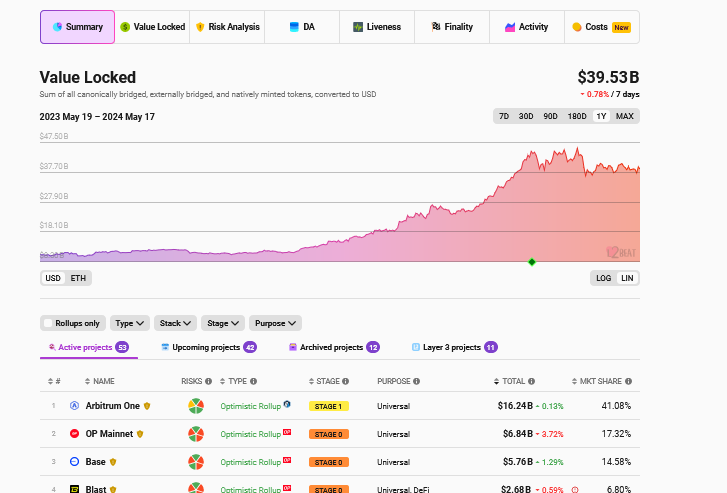Ethereum is a legacy chain that has scaled over time to deal with the wants of the ever-demanding world consumer base. To relieve the mainnet of the deluge of transactions, extra layer-2 platforms have sprouted.
They are cheaper to transact on and scalable, permitting customers to deploy intensive decentralized purposes that received’t be possible on the bottom layer.
Ethereum Layer-2s Are A Success, But There Is A Problem
According to L2Beat, layer-2 platforms on Ethereum at present manage over $39 billion in whole worth locked (TVL). Even so, Nikita Zhavoronkov, a lead developer at Blockchair, is worried and thinks layer-2s are a “huge legal liability waiting to happen.”

Taking to X, Zhavoronkov argues that layer-2 protocols on Ethereum and Bitcoin are susceptible to regulator crackdown. In the developer’s evaluation, these platforms resemble cash service companies (MSBs), contemplating how they’re designed to function. Since they aren’t regulated, the developer stated they could be working illegally.
Top of the checklist, Zhavoronkov argues that the majority current layer-2 options are usually not really decentralized. They level to utilizing multi-signature contracts or “emergency councils” managed by restricted teams as proof of centralized management.
Moreover, the developer highlighted the custodial nature of many layer-2s. Users don’t straight management consumer funds primarily based on how these scalable platforms function. The analyst says this tinge of centralization presents a vulnerability if regulators goal these entities.
Zhavoronkov provides that although layer-2 platforms are enablers, working from a trustless base, they operate as for-profit companies, producing income from transaction charges. Because a few of them, like Optimism and Arbitrum, difficulty tokens, income accrued can affect token costs.
The developer contends that for this reason layer-2 platforms are not any completely different from conventional firms than really decentralized platforms.
More Headwinds For ETH, United States SEC Reported Investigation
Given their mode of operation and mannequin, Zhavoronkov’s assertion that layer-2 options may very well be categorized as MSBs underneath United States legal guidelines is a priority. Such a classification may topic these protocols to stringent laws, compliance necessities, and potential sanctions.
This not solely threatens to stifle innovation but additionally has the potential to hamper Ethereum’s scalability severely.
While some have dismissed Zhavoronkov’s viewpoint as “distorted,” the truth that Ethereum is reportedly underneath investigation by the United States Securities and Exchange Commission (SEC) provides a layer of complexity to the scenario.
Analysts say the SEC’s classification of ETH as a safety somewhat than a commodity like BTC may additional delay the approval of spot Ethereum exchange-traded funds (ETFs).
Feature picture from Canva, chart from TradingView


